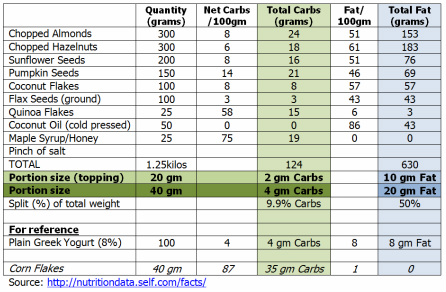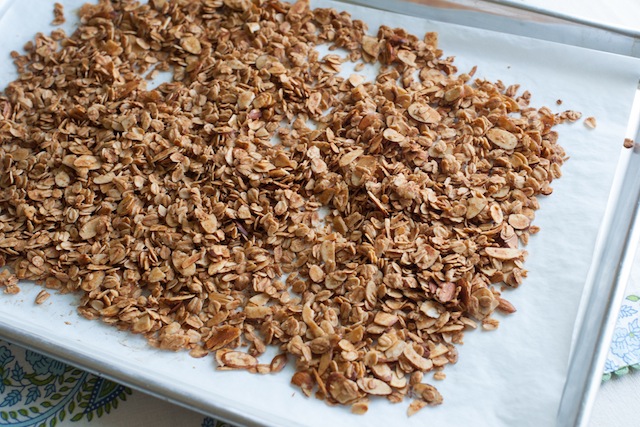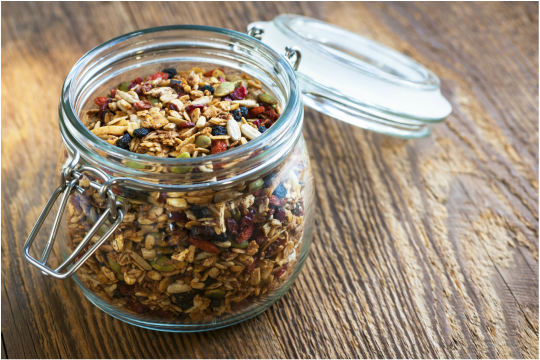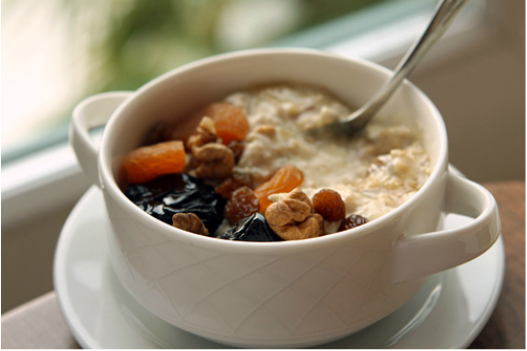From Muesli to Granola
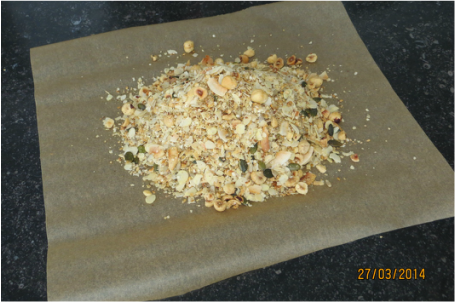 Freshly roasted mixture after 35 minutes at 140C
Freshly roasted mixture after 35 minutes at 140C
Healthy Breakfast Muesli or Granola?
Commercial muesli is a great healthy breakfast... or is it? Traditionally, it's a dry cereal made from whole oats (sometimes plain rolled oats and sometimes toasted), nuts, fruit, seeds and wheat or other cereal flakes. But dry, uncooked cereals are not that easy to digest for many people, even when they've been toasted.
These days there are many versions, including gluten-free muesli, fresh muesli (soaked overnight in water, milk, yogurt or fruit juice to soften and aid digestion), toasted or un-toasted muesli, and its closest relation, granola. For the record, granola was originally patented as granula and like Corn Flakes and other breakfast cereals, was invented in a US sanitarium in the late 19th century.
Muesli usually contains fewer carbs because when making granola, you add some honey or syrup to bring the ingredients together in little clumps.
Your first experience may well have been with the Alpen brand for example, but the problem is - it's loaded with carbs, at 70% per 100gm.
How to make your own healthier muesli or granola
These are the golden rules; please remember that the exact recipe matters less than what your taste buds judge to taste best.
Eating it with good quality yogurt is a plus-point too but what is it that makes store bought muesli unhealthy? On examination, you will find that the packaging looks healthier than the actual contents inside the box and note that almost all commercial brands of muesli and granola are actually laden with extra sugar. They're generally high in carbs (because cereal crops such as oats, wheat and barley, are that much cheaper than nuts and seeds) and often contain certain questionable ingredients to assure a longer shelf life.
While it is true that these days, there are 'healthier options'… they still contain preservatives and are high in carbs... So why don’t you make your own? It’s simple, and you just need to decide on your favourite taste and colour which can range from a kind of crunchy muesli to a full blown toasted granola mix… albeit with far less sugar and few if any carbohydrates coming from cereals.
Commercial muesli is a great healthy breakfast... or is it? Traditionally, it's a dry cereal made from whole oats (sometimes plain rolled oats and sometimes toasted), nuts, fruit, seeds and wheat or other cereal flakes. But dry, uncooked cereals are not that easy to digest for many people, even when they've been toasted.
These days there are many versions, including gluten-free muesli, fresh muesli (soaked overnight in water, milk, yogurt or fruit juice to soften and aid digestion), toasted or un-toasted muesli, and its closest relation, granola. For the record, granola was originally patented as granula and like Corn Flakes and other breakfast cereals, was invented in a US sanitarium in the late 19th century.
Muesli usually contains fewer carbs because when making granola, you add some honey or syrup to bring the ingredients together in little clumps.
Your first experience may well have been with the Alpen brand for example, but the problem is - it's loaded with carbs, at 70% per 100gm.
How to make your own healthier muesli or granola
These are the golden rules; please remember that the exact recipe matters less than what your taste buds judge to taste best.
- Dial up the proportion of nuts and reduce the carbs right down, be they in the form of oats or other cereals
- Eliminate sugar; consider a drop of honey or maple syrup as sweeteners if anything; add very small quantities of dried fruit such as raisins and apricots, a few berries when in season, or a little grated apple as the Swiss prefer
- Making the Swiss version, Bircher Muesli? Soak your ingredients overnight, which builds taste and aids digestion; it’s soggy, not crunchy, but has a charm all of its own.
Eating it with good quality yogurt is a plus-point too but what is it that makes store bought muesli unhealthy? On examination, you will find that the packaging looks healthier than the actual contents inside the box and note that almost all commercial brands of muesli and granola are actually laden with extra sugar. They're generally high in carbs (because cereal crops such as oats, wheat and barley, are that much cheaper than nuts and seeds) and often contain certain questionable ingredients to assure a longer shelf life.
While it is true that these days, there are 'healthier options'… they still contain preservatives and are high in carbs... So why don’t you make your own? It’s simple, and you just need to decide on your favourite taste and colour which can range from a kind of crunchy muesli to a full blown toasted granola mix… albeit with far less sugar and few if any carbohydrates coming from cereals.
Basic Granola RecipeCrunchy Breakfast Muesli - gluten free
The idea is to mix your low-carb selection of nuts and seeds before toasting them in a thin layer on a tray lined with baking paper at 140 degrees C in the oven for 30-40 minutes, stirring them twice after 15 and 25 minutes. Wait till you have just the right warm colours before letting the granola cool down with the oven door open. Don't cook for too long or the more delicate coconut flakes will burn. In fact, these days, I add them after the first 15 minutes. Ingredients:
This recipe is gluten free. Store in an airtight container These are approximate figures - adjust for your own preference - your unique, personalised granola (net-carb figures, fibre excluded)
Granola
Now the only way to get that authentic 'clumpy' granola look is to add something sticky and roast your mixture for around 10 minutes longer before leaving it to cool. That something sticky can be honey or maple syrup for example but whatever you do, this will be adding some carbs. Just keep it to a minimum. If you've followed the master recipe listed above, 100 gm of your mixture contain 10 grams of carbohydrate; you'll need to add a further 5-10 grams of honey to get the mixture clumping together, but then... although it's still very healthy, it should be eaten in smaller quantities. I recommend natural Greek yogurt unsweetened, with a generous 20 gm topping of granola and a few berries. It will still contain less than 10 grams of carbs per complete portion and it's both delicious and nutritious. |
Bircher Muesli
For this Swiss classic, soak a portion of the roasted muesli mix in yogurt, milk or fruit juice, overnight in your fridge. In the morning, add a small amount of fruit of your choice including thinly sliced apples for that authentic Swiss touch. Tastes vary so you'll need to experiment to get just the right soaking mixture in the right quantity for your palate. It will taste soggy but it's healthy and easier on the digestion than un-soaked mueslis and granolas. |
